
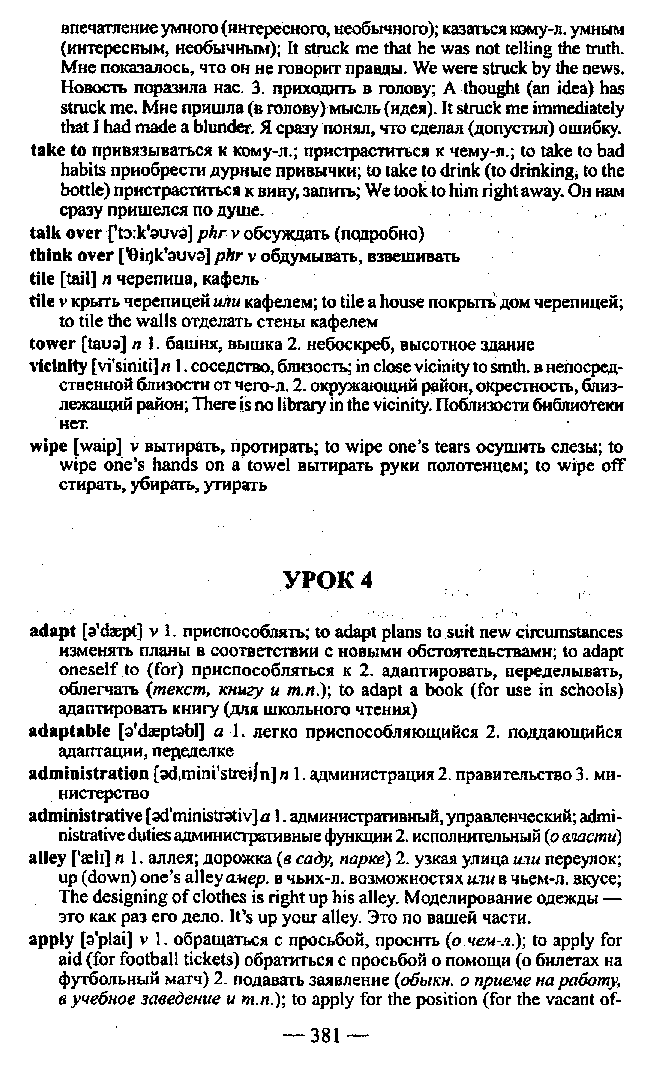
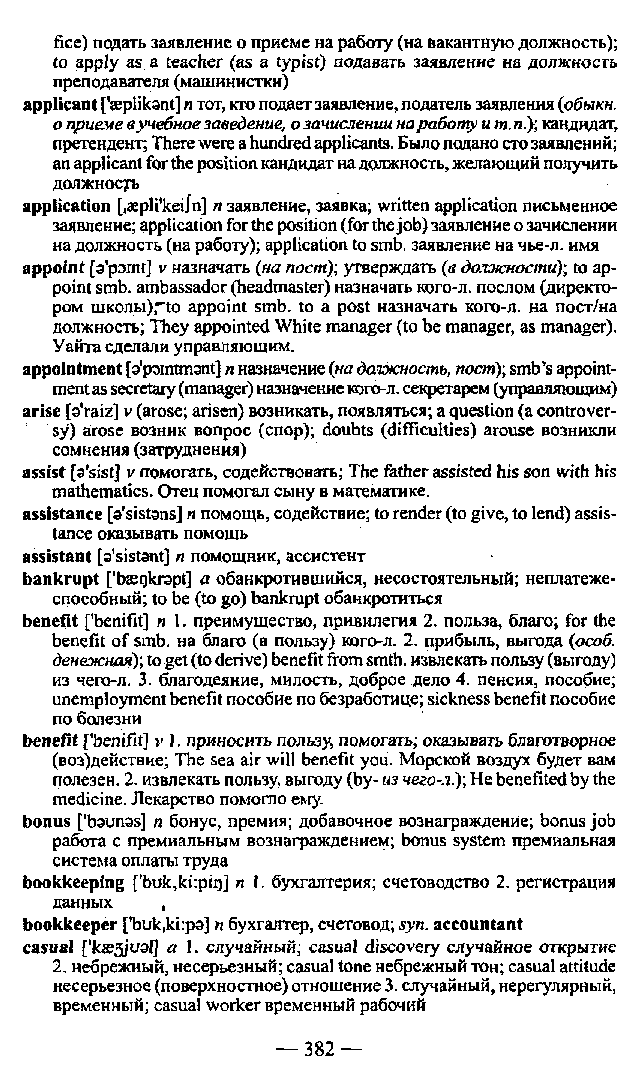
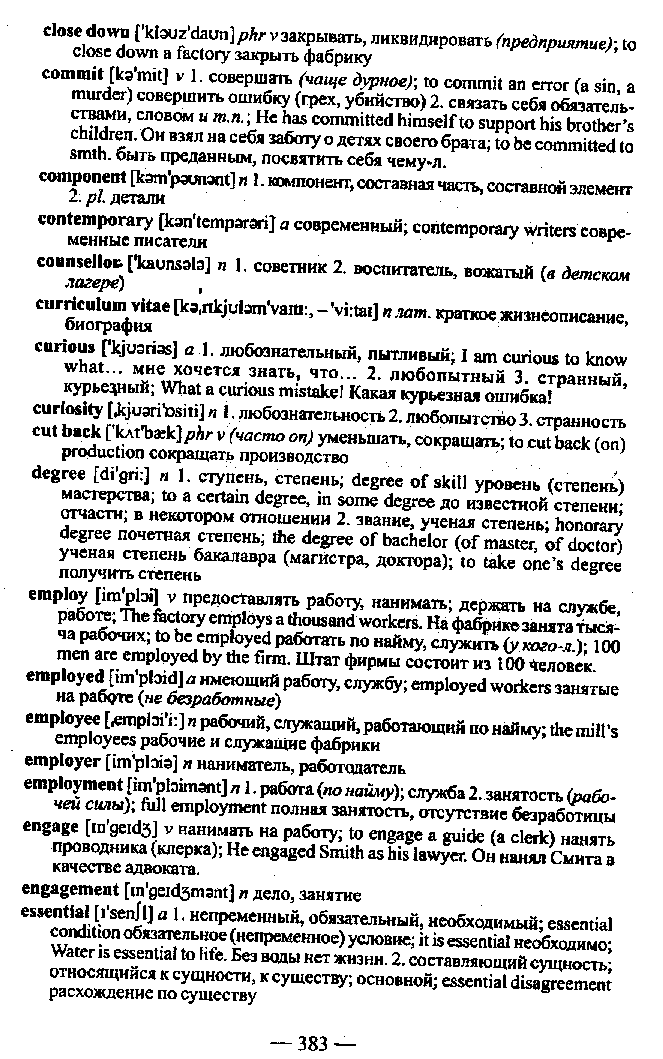
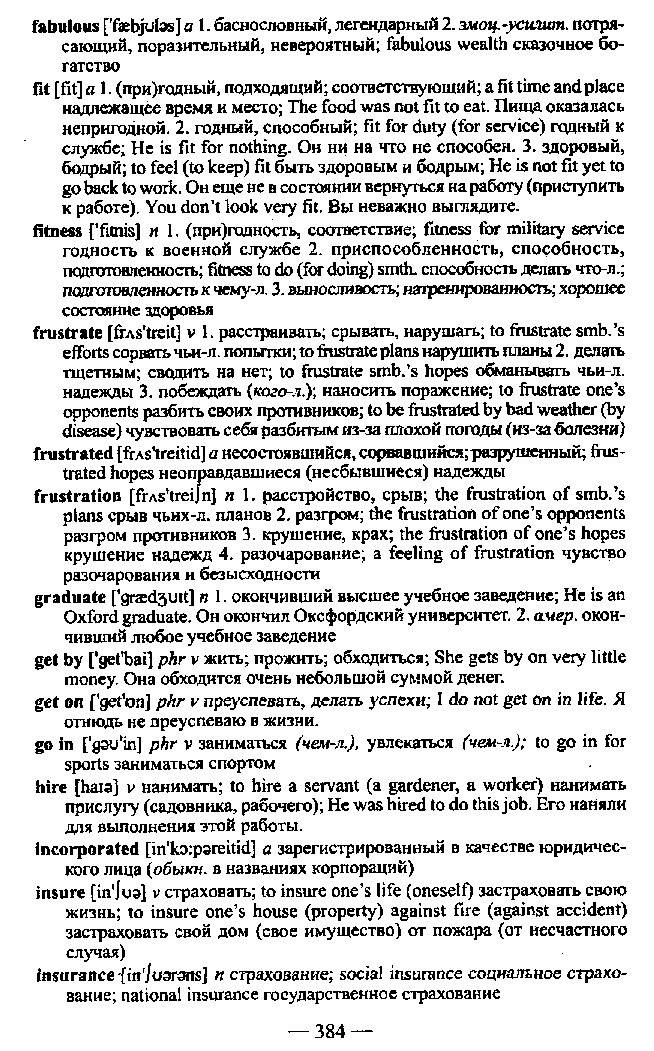
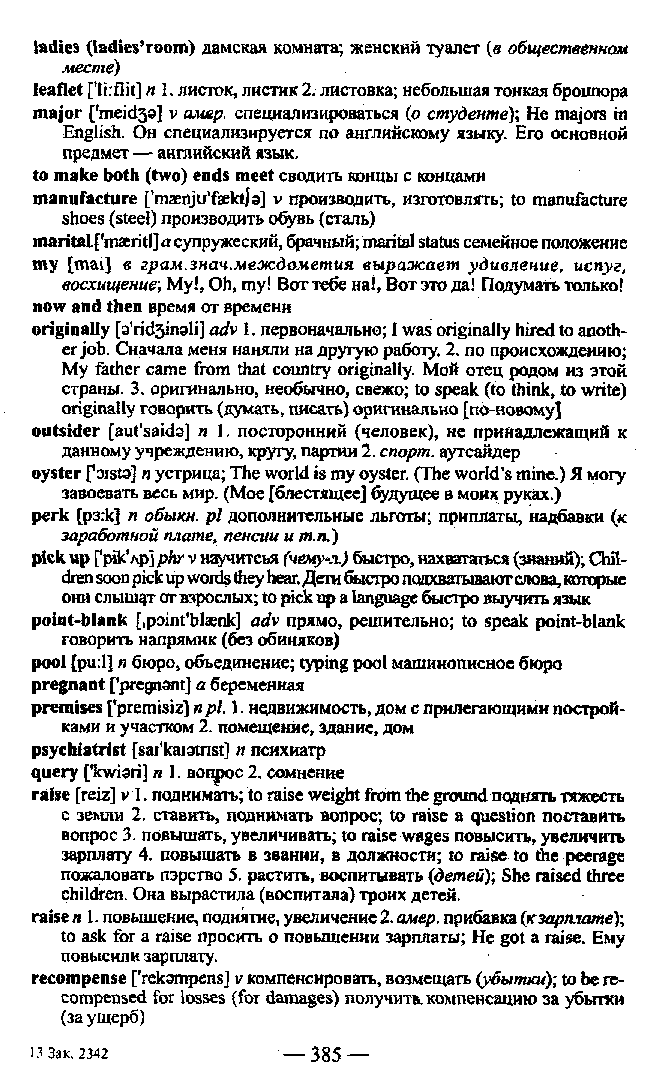
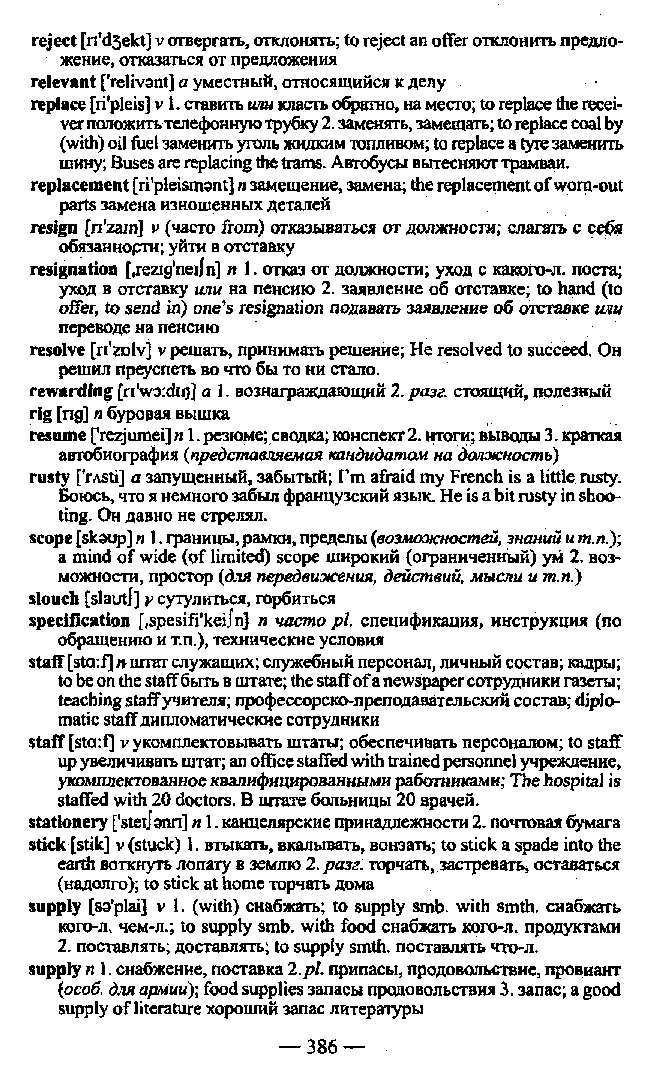
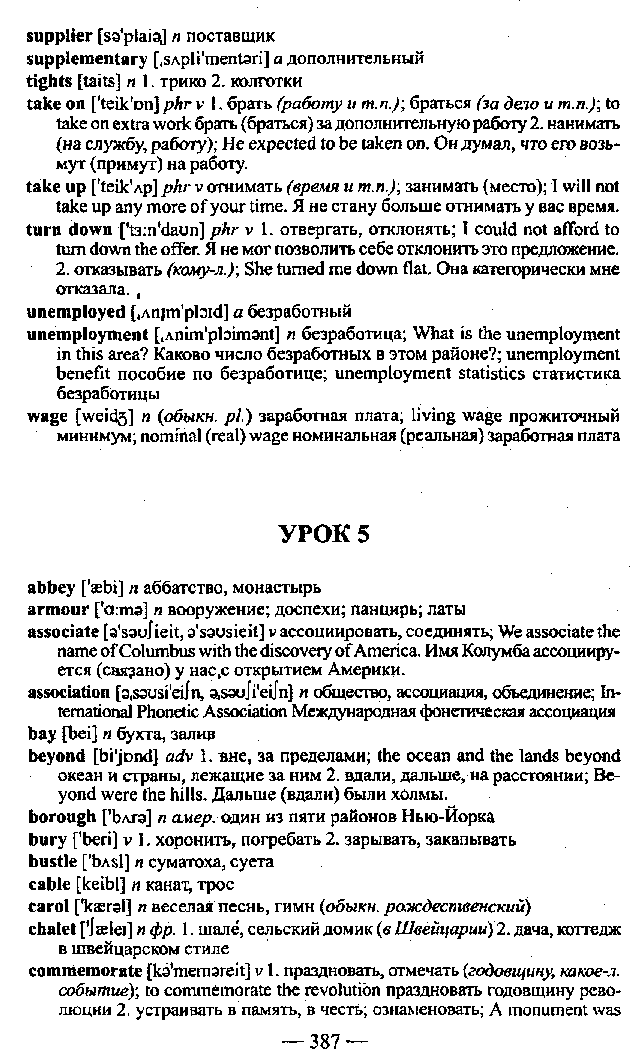
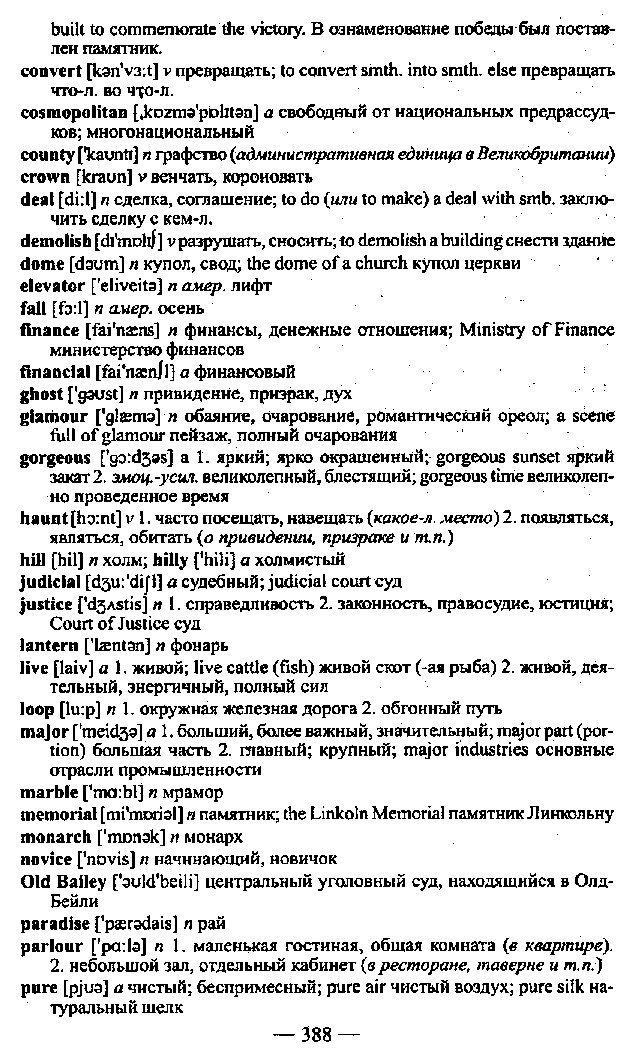
UNIT 4
COMMUNICATION : FEELINGS AND EMOTIONS
Incredulity
You're joking (of course).
You must be joking! colloquial
Come off it! colloquial
You're pulling my leg. colloquial
Practice
Ways of expressing yourself when someone tells you something you find hard to believe (= incredible).
I like crowds,
hard work,
noisy children,
walking in the rain,
taking medicine,
dieting.
I hate television.
spring.
animals.
parties.
sport.
I learned English in a week. I keep an elephant in the garden. I have twelve children. I want to marry you.
В (No)..__________________
Really?
Do/Did/Have you really?
I don't believe you.
I can't believe you.
I really can't believe you/that.
I find that hard to believe.
I refuse to believe you/it/that.
You don't/can't expect me to believe that.
(But) that's incredible.
Surely not!
You're not serious, (are you)?
You can't be serious.
You don't mean that, surely.
/. Tell someone that you:
can speak Chinese fluently; never drink water;
keep a lion as a pet;
hate travelling;
are in love again.
Let him /her express incredulity.
A: I can speak Chinese fluently.
B: No! I don't believe you.
2. Learn the dialogue and make substitutions.
|
Husband: |
Good news, darling. |
|
Wife: |
No, I don't believe you. What is it? (No!) |
|
Husband: |
I'm getting a rise. |
|
Wife: |
No! But that s incredible! (I don't believe you). |
|
Husband: |
A 50% rise. |
|
Wife: |
A 50% rise? I refuse to believe it. (You're pulling my leg). |
|
Husband: |
We'll be able to buy a car. |
|
Wife: |
Really? (You're joking!) |
|
Husband: |
Yes. And a new carpet. |
|
Wife: |
A new carpet? You 're not serious, are you darling? |
|
|
(You can't be serious.) |
|
Husband: |
Oh yes I am. And we'll get a colour TV. |
|
Wife: |
You can't expect me to believe that. It all sounds like |
|
|
a dream. (Surely not!) |
|
Husband: |
Well, it's a dream come true. But we'll have to wait a |
|
|
while. You see, I shan't get the rise till next autumn. |
|
Wife: |
Oh, next autumn. I see. I thought it was too good to |
3. Express incredulity.
I saw ....
— 144 —
— 145 —
GRAMMAR: MODAL VERBS. PROBABILITY: SHOULD. OUGHT TO
Practice
1. Complete the sentences using should or ought to and the correct form of the verbs in the box. Use each verb only once.
pass be win not take
sell arrive receive
I've only got £l 5, but that... enough. We won't need to buy very much.
You ... my letter first thing tomorrow morning. I posted it early today. 3.1 was surprised. Liverpool lost the football match. They ... easily. 4.1 ... my car easily. I only want £950 for it and it's in very good condition. 5. Andrew... the exams last week. He worked very hard for them. 6. 'How long will it take to drive to the park?' 'Well, it... long. It isn't very far.' 7. I'm still waiting for the 7 o'clock bus. It... half an hour ago.
2. Use should or ought to to say that you think something will happen.
Do you think Ted will get the job he applied for? Well, ... .He's got all the necessary qualifications.
Do you think Margaret will pass the examination? Well, .... She has studied very hard.
Do you think Jim will win his tennis match against Tom? Well, .... He's a much better player than Tom.
Do you think £10 will be enough to do all the shopping? Well, it... . But take a bit more in case it isn't.
3: Use should/ought to, or must in the following.
1. Look at all the people standing in line to get into that movie. It... be a good movie. 2. Let's go to the lecture tonight. It ... be interesting. 3. Look. Jack's car is in front of his house. He ... be at home. Let's stop and visit him. 4. A: Hello. May I speak to Jack? B: He isn't here right now. A: What time do you expect him? B: He ... be home around nine or so. 5. A: Who do you think is going to win the game tomorrow? B: Well, our team has better players, so we ... win, but you never know. Anything can happen in sports. 6. A: What time are you going to arrive? B: Well, the trip takes about four hours. I think I'll leave sometime around noon, so I... get there around four. 7. A: Susie is yawning and rubbing
— 146 —
her eyes. B: She ... be sleepy. Let's put her to bed early tonight. 8. Hmmm.
I wonder what's causing the delay. Ellen's plane ... have been here an hour ago. 9.1 thought I had a dollar in my purse, but I don't. I ... have spent it. 10. Ed has been acting strangely lately. He ... be in love. 11. Forty minutes ... She ... have been back for her rest hour by now.
4. Rephrase the sentences using the correct form of the words in brackets.
1. I'm sure she is in bed. (must) 2. We'll probably arrive before
II o'clock, (should) 3. Perhaps he was ill. (may) 4. It's impossible that they missed the plane, (can't) 5. Perhaps she'll phone later, (might) 6. I'll probably be at home by 6 o'clock, (should) 7. Perhaps they went home, (could) 8. It's impossible that he's telling the truth, (can't) 9. I'm sure you've heard the news, (must) 10. Perhaps I won't go out this evening, (may) 11. It's impossible that she saw us. (can't) 12. I'm sure the bus has left, (must) 13. Perhaps he didn't apply for the job. (might) 14. She'll probably be here soon, (ought to)
5. Translate into English.
1. Уже 5.30. Гости скоро должны быть здесь. 2. Думаю, вы поняли, что нужно делать. Домашнее задание не должно занять у вас слишком много времени. 3. Ты думаешь Рита сдаст экзамен? — Да, она должна сдать экзамен. Она много занималась. 4. Ты думаешь, Рита сдала экзамен?—Полагаю, что она должна была сдать его. Она много занималась. 5. Мой вопрос, возможно, озадачит вас, но все же я хочу задать его. 6. Он, должно быть, ничего им не сказал об этом. 7. Тебе следовало бы еще раз прочитать свое сочинение. Там, наверное, есть ошибки. 8. Возможно, они уедут сегодня вечером. 9. Вечер, вероятно, будет интересным. Студенты так долго готовили его. 10. Должно быть, он сейчас пишет о своих приключениях. 11. Вероятно, он получил мое письмо. Я отослал его неделю назад. 12. Никто не отвечает. Может быть, он еще не вернулся с работы. 13. Я бы давно мог это сделать, если бы знал, что это так срочно. 14. Если это рассказ О. Генри, он должен быть интересным. 15. Там, должно быть, никого нет. 16. Вряд ли они вернулись из зоопарка. Они там впервые и могут долго пробыть. 17. Возможно, они были на вечере, но я их не видел.
Где мой ключ? — Ты, наверное, его потерял. — Не может быть, чтобы я его потерял. Я, возможно, оставил его в кармане пальто.
Они боялись, что их, возможно, спросят, почему Том не пришел с ними. 20. Не может быть, чтобы он обманул их, он честный человек. 21. Он должен сдать на права, так как он хороший водитель.
— 147 —
Dialogue В
Mr Kay:
Candidate
(A): Mr Kay: Candidate
(A): Mr Kay: Candidate
(A):
Dialogue С
Mr Kay:
Candidate
(B): Mr Kay: Candidate
(B): Mr Kay:
Dialogue D
Mr Kay:
TOPIC : JOBS AND WORK
Listen, read and practise.
She Seems to Be the Best Qualified
Candidate (C):
Dialogue E
Mr Kay:
Dialogue A
Mr Kay: Twenty applicants — that's not bad for one advert.
I've made a shortlist of five, so we'd better call them
for interview. Mr Samuel: Will next Monday do? Mr Kay: Monday, all right. I'll see this one first, Janita Ling.
Mr Samuel:
Mr
Kay:
— 148 —
Now, Miss Ling, about your qualifications. I see that
you have fluent French as well as English and that
you were working with your last company for four
years. Tell me, why did you leave?
Actually, I didn't leave. The company closed down.
Closed down?
Yes, it went bankrupt. So I was out of job.
I see. And have you been doing anything since?
I had a couple of temporary jobs, and now I really
need something permanent.
So tell me, why are you applying to work in my company?
Well, I was trained in book-keeping and office practice and I'd like to use my secretarial skills. I see. And apart from typing what experience do you have with office machinery? I know how to use the telex machine and the photocopier.
All right. Well, I'll think it over and we'll get in touch with you in a day or two. Thank you for coming.
Now let me tell you a few things about the job. You know the salary already. We pay a bonus twice a year and we give three weeks' holiday a year. Office hours are nine to five thirty and we work a five-day week. Do you have any questions?
Er, yes. Well, I insist on a doctor's certificate if staff are away for longer than a couple of days.
Miss Ling is still my first choice, so could you give her a ring and I'll offer her the job. If she accepts I'll write to the others straight away so as not to keep them waiting.
Are you going to take up her references?
No, there's no need to do that. I'm pretty sure we can trust her. If she accepts I'll write her a letter of appointment.
— 149 —
A. Questions.
1. What post did Mr Kay advertise and why? 2. Was Mr Kay pleased with the number of applicants? 3. How many applicants was Mr Kay going to interview? 4. Does Miss Ling have a degree? 5. Why was she out of work? 6. What particular skills was Mr Kay looking for in his applicants? 7. How many hours a week does Mr Kay's office work? 8. Was Mr Kay offering a full-time or a part-time job?
B. Ask and answer questions about a) the vacancy in Mr Kay's office; b) the candidates who applied for the job c) the interview.
C. Retell the text and roleplay the conversations.
D. Practice.
1. Translate the following sentences.
This sort of work won't do for him. 2. He will do for us. 3. This hat will do. 4. Will these brown shoes do? 5. This room will do for an office. 6. Can I have a bottle of red wine? — Will port do? 7. When shall we meet? — Will Friday do?
Answer the questions as in the example.
— What does your father do?
— He works as an engineer at one of the city plants.
1. What does your husband do? 2. What is your brother's job? 3. What does your sister do? 4. What do you do? 5. What does Henry do? 6. What does your mother do? 7. What is your friend's job?
3. Make up sentences. Do it as in the example.
Travelling is the best way to make friends.
4. Respond giving reasons.
— Shall we send a telegram?
— No, there's no need to do that. She knows about our arrival.
1. Shall I buy some meat? 2. Shall I help her? 3. Shall I phone him? 4. Shall we tell her? 5. Shall we take a taxi? 6. Shall I write to her? 7. Shall we have to start early?
— 150 —
5. Complete the sentences using had better and the verbs in the box. >=• The phone is ringing. I'd better answer it.
park stay hurry answer put out be not leave
1. This knife is very sharp. You... careful when you use it. 2. Oh, no! Look! There's a 'No Parking' sign here. We... somewhere else. 3. You're not very well. I think you... in bed today. 4. We're late. We.... 5. There's a lot of crime in this area. We... any doors or windows unlocked. 6. The plane is just going to take off. You... that cigarette.
People and Their Jobs
1. Lucy works in a travel agency. Her salary is very low. She only gets three weeks' holiday a year and she works long hours. But Lucy doesn't mind, because she enjoys her work. She has a nice boss and she meets a lot of people during the day. Her work is interesting and varied. Also, every year her company gives her a free two-week holiday in Europe.
A. Imagine you meet Lucy. Ask her questions about her job.
B. Think of other jobs with good 'perks'. С What are good working conditions?
2. Paul works on a car assembly line in a factory. He is a skilled worker and he does a lot of overtime; so at the end of each week he takes home quite a good wage. However, he doesn't enjoy his work. He finds it boring and monotonous. He gets four weeks' holiday a year, but be cause there are several public holidays and sometimes strikes in the factory, he doesn't usually work 48 weeks a year.
A. Imagine you meet Paul. Ask him questions about his job.
B. Would you like to work in a factory? Why? Why not? Are there a lot of strikes in your country?
3. Tom is unemployed. He is a university graduate and he has a degree in sociology. However, Tom cannot find a good job. Each week he receives some money from the government called 'Social Security'. With this money he pays the rent and buys his food, but at the end of the week he is always 'broke'.
A. Imagine you meet Tom. Ask him questions about his life.
— 151 —
В. Does your government give money to the unemployed? Are there many unemployed graduates in your country?
4. Mr Charles is a successful businessman. He is a company director. He earns a lot of money, and he also pays a lot of income tax. He is 64 and next year he is going to retire. He will get a good pension from his company and also an old age pension from the state. He is looking for ward to his retirement. He wants to read a lot and go fishing.
A. Ask Mr Charles some questions.
B. What is the usual retirement age in your country? Can you talk about pension schemes in your country?
5. Henry: I'm a pop star. I earn about £60,000 a year. Being a pop star means all sorts of things. It means I don't have to worry about money any more. It means I can do what I want to do. For example, I hate having to get up early. I can't stand working in offices or in factories. I can't bear having to work at fixed hours. That's why I enjoy being a pop star. I like playing in front of large audiences. I even like all those young girls screaming and trying to tear my clothes off.
A. Imagine you meet Henry. Ask him questions about his job.
B. Would you like to be a pop star? Do you think it is an interesting job?
6. Alice: I'm a nurse and I don't earn very much money at all. In fact, I have a lot of difficulty in just making ends meet, as we say. But I like being a nurse. I suppose it's because I enjoy helping people. Being a nurse is hard work. It means working all sorts of hours. And it isn't very pleasant some times. There are all sorts of things I don't enjoy. For example, I don't enjoy seeing people in pain. Working ten hours a day and more in a hospital isn't much fun, but at least you know you're doing something worthwhile.
A. Imagine you meet Alice. Ask her questions about her job.
B. Tell your classmates about your job. Say what you like and what you don't like about your job.
C. Tell about your friend s (mother's, father's, etc.) job. Say whether she/he likes it or not. Say why.
7. John: The job that I have recently started is as a sales representative with a company that produces garden furniture. The company, called 'Sunnosit', is based in Thornton, a small town in the Midlands. The area
manager, who has been with the company for over thirty years, is due to retire next year, which means I might get his job if I do well. One great advantage is having a company car, which I have to have, because the job involves visiting different parts of the country. My colleagues, who I get on well with, are quite ambitious, which means the atmosphere at work is rather competitive. I don't mind. Apart from that, the job is fine.
A. Imagine you meet John. Ask him questions about his job.
B. Are you ambitious? What are your colleagues like? Do you like your boss? What is he/she like? Is your work challenging?
Getting a Job
In Britain there is a special service for school leavers, the Careers Advisory Service, which helps young people who are looking for their first jobs. Careers Officers give practical advice on interview techniques, application forms, letters, pay, National Insurance and Trade Unions. This is an extract from a leaflet which is given to young people by Dorset Careers Service.
The interview
You've got an interview for a job — good! So now for the hard work. To do well at an interview you need to put in some thought first.
The employer wants to know if you are the person he wants, so you'll be asked about yourself. Think about it now:
What do I do well? School activities?
What are my good points? School subjects?
Why would I like this job? Previous work?
Spare-time interests? Saturday job?
What is my family like? What do I like doing and why? What do I not like doing and why?
You will want to ask questions too.
The job itself? Can I see where I
Training? would be working
Prospects? Hours?
Further Education? £££? Conditions?
— 152 —
— 153 —
Write your questions down and take them with you. Before the interview
Find out what you can about the firm.
Find out the interviewer's name and telephone number.
Find out where the interview is.
Find out how long it will take to get there.
Make sure you know what the job involves.
Dress to look clean and tidy.
At the Interview
Do arrive early. Phone if you're held up.
Do try to smile.
Do show interest in the job and ask questions.
Do be polite.
Don't panic, even if faced by more than one person.
Don't slouch around and look bored.
Don't smoke or chew.
Don't give one word answers or say you don't care what you do
Look at these job advertisements.
